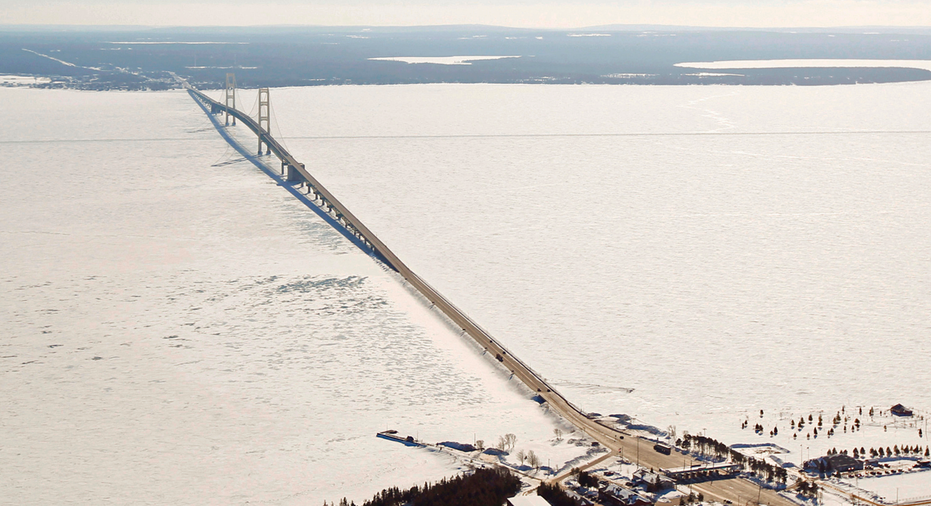Michigan official: Tugboat damaged Great Lakes pipelines

TRAVERSE CITY, Mich. – A tugboat anchor struck underwater oil and electrical lines and caused an insulation fluid spill in the waterway connecting Lake Michigan and Lake Huron earlier this month, Michigan's attorney general said Tuesday.
Bill Schuette said he notified VanEnkevort Tug & Barge that he's planning civil action against the company, saying its tug, named Clyde S. VanEnkevort, had caused the damage in the Straits of Mackinac, a busy passageway for freight haulers and pleasure craft.
"The vessel ignored markers in the channel and clearly identified hazards on navigational charts that make clear that an anchor should not be deployed in this area of Straits," Schuette said in a statement.
Company spokesman Darrell Wilson acknowledged that a tug and barge belonging to VanEnkefort, based in Escanaba, Michigan, were among vessels that transited the straits area April 1, the day the damage happened.
"We are fully participating with all relevant authorities as they conduct the investigation," Wilson said in a statement, adding that it would be inappropriate to comment further.
Wilson did not confirm or deny Schuette's contention that the vessel dragged its anchor along the bottomlands while passing through the straits or that it was to blame for the damage.
A team of federal, state and tribal officials is continuing to gather facts and will release its findings when finished, U.S. Coast Guard Cmdr. Shaun Edwards said in a phone conference with reporters. He and other investigators declined comment on Schuette's announcement, saying the attorney general had acted separately.
Anyone found to have committed wrongdoing could lose mariner credentials and be referred to the Department of Justice for criminal investigation, Edwards said.
Two electric cables leaked 600 gallons (2,270 liters) of insulation fluid containing mineral oil and benzene compounds. Enbridge Inc.'s twin Line 5 pipelines carry crude oil and liquefied natural gas. The company has said the pipelines were dented but the integrity of the lines weren't compromised. The pipelines and cables are about 400 yards (366 meters) apart in the straits, where depths exceed 200 feet (60 meters).
Under Michigan law, causing such a leak is punishable by a civil fine of up to $25,000 per day of the discharge, as well as damages for harm to natural resources, attorney's fees and court costs, Schuette said. He said those responsible for the anchor deployment or maintenance also could face criminal charges or other legal liability.
An anchor strike had been suspected in the damage, but officials hadn't previously released details, including of who might be responsible.
Coast Guard regulations don't specifically prohibit anchoring in the area, but "prudent seamanship would obviously tell you to at least be careful," especially with nautical charts clearly showing where the cables and pipelines are located, Coast Guard spokesman Sean Murphy said.
Enbridge's Line 5 carries 23 million gallons (87 million liters) of oil daily between Superior, Wisconsin, and Sarnia, Ontario. The segment that crosses the nearly 5-mile-wide (8-kilometer-wide) straits is divided into two side-by-side pipes that were laid on the lake bottom in 1953.
The company has described the dents in its pipelines as minor, based on mechanical inspections of their interior. Enbridge was preparing to launch a remote underwater vehicle to examine them from the outside.
The government investigative team plans to deploy a different camera-equipped vehicle this week for a close-up look at the ruined cables after conducting a side-sonar survey to find where the damaged sections are, Murphy said.
The power cables are owned by American Transmission Company, which will pay for the government response and cleanup, spokesman Duane Schoon said. The costs have yet to be calculated, he said.
The Coast Guard and other agencies are monitoring the straits area by boat and air but have found no signs of pollution or harm to wildlife, said Scott Schaefer of the Michigan Department of Environmental Quality.
___
Runk reported from Detroit.



















